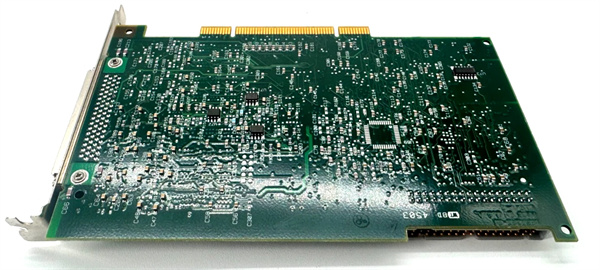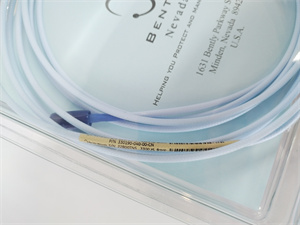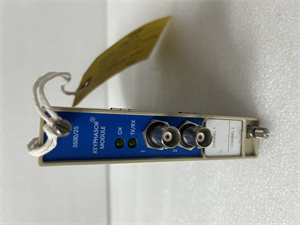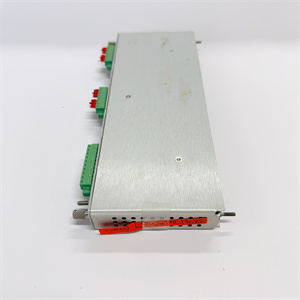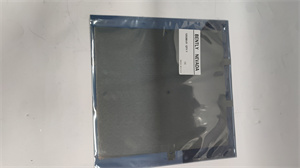Description
Detailed parameter table
| Parameter name | Parameter value |
| Product model | NI PCI-6711 |
| Manufacturer | National Instruments (NI) |
| Product category | High-Precision Analog Output Card (PCI Interface) |
| Electrical performance | 8 single-ended analog output channels; Resolution: 16-bit; Output ranges: ±10 V, ±5 V, 0–10 V, 0–5 V (software-selectable per channel); Max output current: ±10 mA per channel; Slew rate: 2 V/µs |
| Physical size | Dimensions (L×W×H): 175 mm × 106 mm × 20 mm (standard PCI form factor); Weight: Approximately 200 g |
| Interface type | PCI 2.3 compliant (32-bit, 33 MHz); 68-pin SCSI-II connector (analog output signals); 10-pin header (external trigger/synchronization); RTSI bus connector (8-line) |
| Communication protocol | PCI bus for data transfer; Compatible with NI-DAQmx driver; Supports DMA (Direct Memory Access) for waveform playback; Supports SCPI and register-level programming |
| Environmental requirements | Operating temperature: 0 °C to 55 °C; Storage temperature: -20 °C to 70 °C; Relative humidity: 10% to 90% (non-condensing); Vibration resistance: 2 g (10 Hz to 500 Hz); Shock resistance: 50 g (11 ms half-sine) |
| Installation method | Standard PCI slot mounting (compatible with PCI 2.1/2.2/2.3 chassis); ESD protection (±15 kV air discharge) required; Powered by PCI bus (no external power supply) |
| Performance indicators | Output accuracy: ±0.01% full scale (FS) at 25 °C; Linearity error: ±0.005% FS; Per-channel update rate: 1 MS/s; Aggregate update rate: 8 MS/s; Onboard FIFO buffer: 16 kB |
| Power requirements | Typical power consumption: 6 W; Peak power consumption: 9 W (during maximum update rate operation) |
| Compatibility | Supported OS: Windows 7/10/11 (32-bit/64-bit); Compatible software: NI LabVIEW, LabWindows/CVI, C/C++, .NET; Integrates with NI TestStand for test automation |
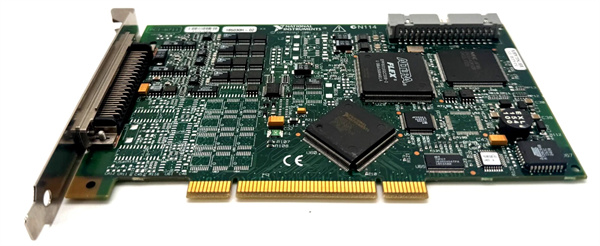
NI PCI-6711
Product introduction
The NI PCI-6711 is a high-precision analog output card developed by National Instruments (NI), belonging to NI’s Premium Analog Output product series—engineered for applications demanding lab-grade accuracy in multi-channel signal generation. Unlike mid-range models like the NI PCI-6704 (12-bit resolution), the NI PCI-6711 elevates performance with 16-bit resolution (65,536 discrete levels) and ±0.01% FS output accuracy, making it indispensable for precision-critical tasks such as calibration systems, aerospace component testing, and high-end industrial control.
In automation systems, the NI PCI-6711 acts as a “precision signal source” for coordinated high-accuracy operations. For example, in a semiconductor wafer prober, it uses 8 channels to output analog voltages (0–10 V) for calibrating sensor readouts—each with 16-bit precision ensuring 152.59 µV step adjustments, critical for aligning probing tools to micron-level wafer features. Its RTSI bus support also enables synchronization with other NI devices (e.g., DAQ cards), ensuring signal generation aligns with data acquisition—eliminating timing errors that could compromise test results.
Core advantages and technical highlights
Ultra-High Precision for Critical Calibration: The NI PCI-6711’s 16-bit resolution and ±0.01% FS accuracy set it apart from 12-bit alternatives like the NI PCI-6704. This level of precision enables it to generate reference signals for calibrating high-end sensors (e.g., pressure transducers with ±0.02% FS accuracy). For instance, in a medical device calibration lab, the NI PCI-6711 outputs a 5.0000 V reference signal (error < 0.5 µV) to verify the accuracy of patient monitors—ensuring compliance with FDA standards. Its low linearity error (±0.005% FS) further guarantees signal integrity across the entire output range, avoiding distortion that could skew calibration results.
High-Speed Synchronized Output: With a per-channel update rate of 1 MS/s and aggregate rate of 8 MS/s, the NI PCI-6711 delivers fast, synchronized signal generation—critical for dynamic testing. Unlike the NI PCI-6704 (500 kS/s aggregate rate), it can update all 8 channels simultaneously at 1 MS/s, making it ideal for simulating fast-changing physical phenomena (e.g., vibration waveforms in automotive crash tests). The 16 kB FIFO buffer preloads complex waveforms (e.g., 16,000 data points per channel), enabling continuous playback without CPU intervention—reducing latency and ensuring signal consistency.
RTSI Synchronization for Multi-Device Coordination: The NI PCI-6711 includes an 8-line RTSI bus connector, enabling sub-microsecond synchronization with other NI instruments (e.g., NI PCI-6259 DAQ cards). In an aerospace actuator test rig, this feature ensures the NI PCI-6711’s control signals (±5 V for actuator position) align with the DAQ card’s force measurements—eliminating timing skew that could mislead engineers about actuator performance. This synchronization is impossible with the NI PCI-6704 (no RTSI support), making the NI PCI-6711 the only choice for multi-instrument precision setups.
Typical application scenarios
In aerospace manufacturing, the NI PCI-6711 is used for flight control system testing. For a satellite’s attitude control module, it generates 8 channels of analog signals (±10 V) to simulate sensor inputs (e.g., gyroscope and accelerometer data) at 1 MS/s per channel. The NI PCI-6711’s 16-bit precision ensures the simulated signals match real-world sensor behavior within ±0.01%—critical for validating the module’s ability to adjust satellite orientation. Its RTSI synchronization with a NI PCI-5112 digitizer also captures the module’s output responses, enabling engineers to verify that control commands meet NASA’s strict accuracy requirements (±0.02% of full scale).
In medical device development, the NI PCI-6711 supports MRI machine calibration. It uses 4 channels to output analog voltages (0–5 V) for calibrating gradient coils—each with 16-bit resolution ensuring 76.29 µV adjustments, necessary for producing clear, artifact-free MRI images. The NI PCI-6711’s low noise (5 µV rms) prevents signal interference that could distort coil calibration, while its 1 MS/s update rate enables rapid adjustment of coil parameters—reducing calibration time from 8 hours (with legacy tools) to 2 hours.
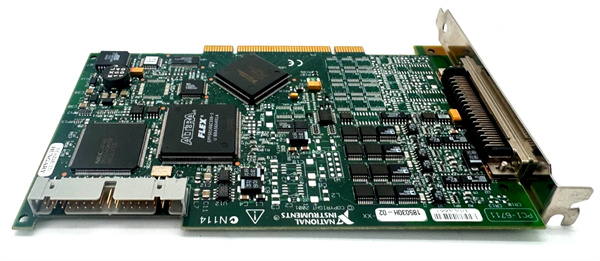
NI PCI-6711
Related model recommendations
NI PCI-6704: A mid-range analog output card with 12-bit resolution (vs. 16-bit in NI PCI-6711) and 8 channels. It is a cost-effective alternative for applications where precision requirements are lower (e.g., basic industrial control), serving as a entry-level option before upgrading to NI PCI-6711.
NI PCI-6259: A multifunction DAQ card that pairs with NI PCI-6711. The NI PCI-6711 generates test signals, while the NI PCI-6259 acquires DUT responses—synchronized via RTSI for precision test systems (e.g., sensor calibration).
NI PXIe-6738: A PXI Express upgrade of NI PCI-6711, offering 16 channels, 16-bit resolution, and 2 MS/s per-channel update rate. It replaces NI PCI-6711 in modular test racks (e.g., ATE systems) requiring higher channel density and faster speeds.
NI PCI-6602: A counter/timer card that adds timing triggers to NI PCI-6711. It generates precise clock signals to control the NI PCI-6711’s waveform playback, ensuring alignment with external events (e.g., conveyor belt positions in manufacturing).
NI USB-6366: A USB-powered DAQ card complementary to NI PCI-6711 for field calibration. It verifies the NI PCI-6711’s output accuracy on-site (e.g., at aerospace test facilities), ensuring consistency between lab and field operations.
NI LabVIEW 2024: Essential software for NI PCI-6711, providing pre-built VIs for precision waveform generation (e.g., sine waves with < 0.01% distortion) and calibration. It lets users automate accuracy verification routines for the NI PCI-6711, reducing manual effort by 80%.
Installation, commissioning and maintenance instructions
Installation preparation: Before installing NI PCI-6711, power off the host system and confirm an empty PCI 2.1/2.2/2.3 slot with adequate ventilation (to prevent overheating). Wear an ESD wristband (rated ±15 kV) and work on a grounded bench to protect the card’s precision analog circuits. Insert NI PCI-6711 firmly into the slot until the edge connector is fully seated, then secure with a chassis screw. Connect load devices (e.g., calibration tools, actuators) to the 68-pin SCSI-II connector using shielded twisted-pair cables (to minimize noise). For RTSI synchronization, connect an 8-line RTSI cable to other NI devices. Install the latest NI-DAQmx driver, then use NI Measurement & Automation Explorer (MAX) to detect NI PCI-6711 and run a precision self-test (verifying output accuracy and synchronization).
Maintenance suggestions: Calibrate NI PCI-6711 semi-annually using a NIST-traceable voltage reference (e.g., NI 9172) to maintain ±0.01% FS accuracy—temperature fluctuations > 2 °C can degrade precision. Inspect connectors monthly: clean 68-pin and RTSI contacts with isopropyl alcohol (99.9% purity) and a lint-free cloth to remove oxidation. If NI PCI-6711 outputs drift beyond specs, replace its internal reference capacitor (available via NI’s spare parts program) every 3 years. Avoid exposing NI PCI-6711 to temperatures above 55 °C or humidity above 90%, as extreme conditions can damage its precision DACs (digital-to-analog converters).
Service and guarantee commitment
National Instruments (NI) provides a 3-year standard warranty for NI PCI-6711—longer than the industry average for precision analog equipment—covering defects in materials and workmanship. For extended protection, the ServicePlus Premium plan extends coverage to 7 years, including annual factory calibration (traceable to NIST), priority technical support (2-hour response time for critical issues), and expedited repairs (turnaround time < 2 business days).
NI’s global technical team (specialized in precision analog systems) offers 24/7 support for NI PCI-6711, assisting with configuration, troubleshooting (e.g., drift correction), and software integration. Customers also gain free access to exclusive resources: application notes on high-precision calibration, LabVIEW example code for NI PCI-6711, and a user community for sharing best practices. For out-of-warranty repairs, NI’s Precision Restore Service restores NI PCI-6711 to factory specs—replacing aged components and verifying 16-bit resolution and ±0.01% FS accuracy—reflecting NI’s confidence in the card’s durability and commitment to supporting precision-driven workflows.

